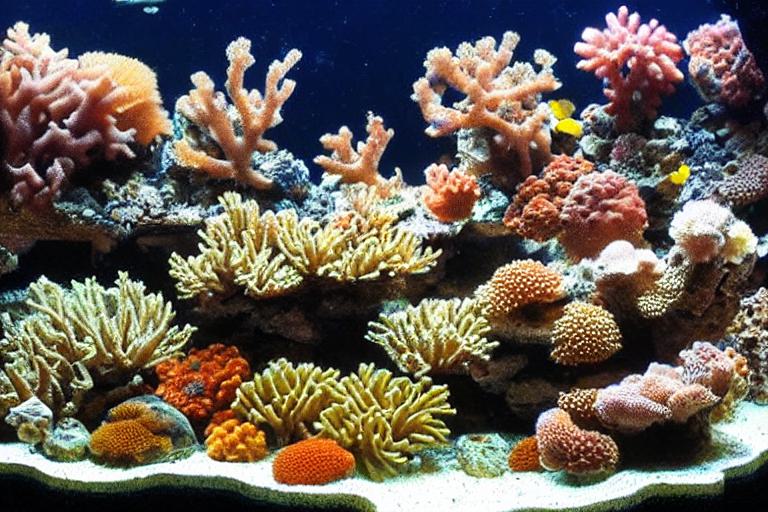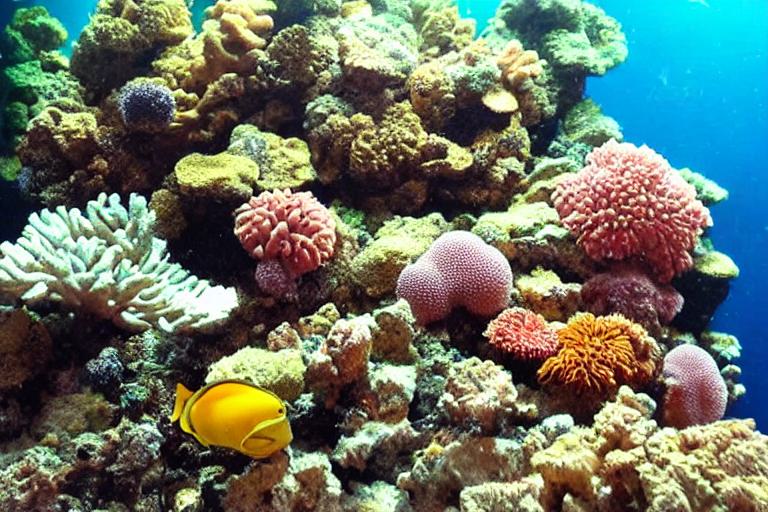Corals are animals that extract nutrients from the water around them. In the wild, they get the majority of their food from the plankton that drift by in the currents. In a reef aquarium, there is often not enough plankton for the corals to feed on, so they need to be fed.
Do You Need to Feed Your Corals?
Corals are a type of marine invertebrate that are related to anemones and jellyfish. They are often found in tropical reefs and can be a variety of colors. Corals are mostly made up of calcium carbonate and have a hard skeleton.
Photosynthesis is the process where light energy is converted into chemical energy that can be used by plants. Corals use their tentacles to capture zooplankton and bring it to their mouth. Corals get their food from two sources: photosynthesis and zooplankton. Zooplankton are tiny animals that drift in the ocean.
If you see your corals shrinking or turning white, this may be a sign that they are not getting enough food and you should start feeding them. Most corals in a reef tank do not need to be fed because they can get all the food they need from photosynthesis and zooplankton. However, some corals may not be getting enough food and may need to be fed.

Why Exactly Should You Be Feeding Your Corals?
As corals in a reef tank grow, they will eventually need food. Zooplankton are rich in nutrients and help corals grow and thrive. The most common food source for corals are zooplankton, which are tiny animals that drift in the water.
You can also sometimes find zooplankton in the live rock or sand in your aquarium. You can purchase a zooplankton culture from a reef aquarium supplier, or you can set up a zooplankton trap in your aquarium. There are a few different ways to provide zooplankton to your corals.
When choosing a food source for your corals, be sure to pick one that is rich in nutrients and will help them grow and thrive. It is important to feed your corals regularly, as they will not be able to get all the nutrients they need from the water alone.
What Kind of Food Should You Feed Your Corals?
In the wild, they rely on a constant supply of plankton for food. Corals are beautiful, but they are also very sensitive creatures. But in a reef tank, they can’t always get the food they need.
That’s why it’s important to feed your corals. But what kind of food should you use?
There are a few different options. You can use live plankton, frozen plankton, or a coral food paste.
And coral food paste is a good option for corals that are picky eaters. Frozen plankton is a good second choice. Live plankton is the best option, but it can be hard to find.
Whatever food you choose, make sure to give your corals a variety. They need different types of nutrients to stay healthy.
And remember, corals are sensitive creatures. So be careful not to overfeed them. A little food goes a long way.

How Do You Feed Your Corals?
While they may look like plants, corals are actually animals that contain a symbiotic relationship with algae. The algae provides the coral with food and the coral provides the algae with a place to live. Corals are beautiful and intriguing creatures that are often kept in reef tanks.
However, in a reef tank, the algae may not be able to provide enough food for the coral. In the wild, corals get the majority of their food from the algae they host. In this case, you will need to supplement the coral’s diet with other food sources.
One way to feed your corals is to target feed them. This can be done by using a turkey baster or syringe to deliver food directly to the coral. Another way to feed your corals is to add food to the water column. This can be done by using a reef-safe fish food or by adding frozen mysis shrimp to the tank.
No matter which method you choose, it is important to only feed your corals small amounts of food at a time. Overfeeding can lead to water pollution and can harm the coral.
Direct Feeding of Coral
Coral in a reef tank generally don’t need food as they can get what they need from the water column. This can be done by using a turkey baster or syringe to target feed them. However, you can direct feed them if you want to. It’s best to do this at night when they are most active.
Indirect Feeding of Coral
This can be done by adding fish to the tank that will eat algae and other food that the coral can’t get on their own. Coral in a reef tank don’t need food as they can get energy from the sun. The fish waste will also provide nutrients for the coral. However, they can benefit from being fed indirectly.
Some Final Tips and Suggestions For Coral Feeding:
First, it is important to target feed each coral. This means using a syringe or turkey baster to deliver food directly to the coral. When it comes to feeding corals in a reef tank, there are a few things to keep in mind. Second, it is important to feed a variety of foods. Lastly, it is important to feed corals at night. This is when they are most active and will be able to make the most use of the food. This will ensure that the coral gets the nutrients it needs.
Watch an Expert Feed His Corals
In the wild, corals get their food from the water around them. But in a reef tank, corals need to be fed. Corals are often thought of as plants, but they are actually animals.
Each type of coral has different food requirements. Reef tanks are home to many different types of corals. Some corals need to be fed daily, while others only need to be fed once a week.
Overfeeding can cause corals to expel their food and can lead to water quality problems. Feeding corals is not difficult, but it is important to do it correctly.
To watch an expert feed his corals, check out this video from Reef Builders:
Research Your Coral Species
Coral reefs are some of the most diverse ecosystems on Earth. They are home to a wide variety of plant and animal life, including many species of coral.
When you are considering adding coral to your reef tank, it is important to do your research and learn about the different species available. Each species has different requirements in terms of water quality, lighting, and feeding.
Some corals are more difficult to care for than others, so it is important to choose a species that is appropriate for your level of experience. With proper care, your coral will thrive and add beauty and interest to your reef tank.
Tailor Your Tank Lighting to Your Coral
However, some corals may benefit from supplemental feeding, especially if they are not getting enough light. Most corals in a reef tank do not need food because they rely on the light from the sun to provide them with the energy they need to grow and thrive.
There are many different types of lighting available, and you should choose the one that best suits your needs. If you have corals that are not getting enough light, you may want to consider adding supplemental lighting to your tank.
If you have corals that are not getting enough food, you may want to consider adding a supplemental feeding system to your tank. There are many different types of feeding systems available, and you should choose the one that best suits your needs.
Frequently Asked Questions
1. What do corals in a reef tank need?
Corals in a reef tank need light and water flow. They also need a source of food, either from the water column or from their symbiotic algae.
2. How much food do corals need?
Corals need very little food, just a few micrograms per day. Most of their food comes from the symbiotic algae that live in their tissues.
3. What happens if corals don’t get enough food?
If corals don’t get enough food, they will start to shrink and eventually die.
4. What is the best way to feed corals?
The best way to feed corals is to target feed them with a small amount of food several times a week. This will ensure that they get the food they need without polluting the water.
5. What are some common foods that corals eat?
Some common foods that corals eat are phytoplankton, zooplankton, and small pieces of fish or shrimp.
Final thoughts
Corals are beautiful and fascinating creatures that many people enjoy keeping in reef tanks. While it is possible to keep corals alive without feeding them, they will not thrive. Corals need food to grow and reproduce, and without a regular food source, they will slowly die. If you are interested in keeping corals in your reef tank, be sure to research their care requirements and provide them with the food they need to stay healthy and happy.
